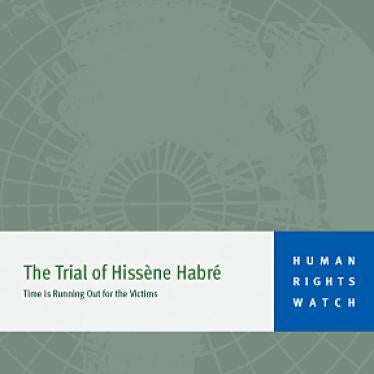(Banjul)- African leaders meeting at the African Union summit on July 1 and 2 must contribute more troops to protect civilians in Darfur and urge Sudan to consent to a U.N. force in Darfur, Human Rights Watch said today in a letter to the leaders. They should also call on Senegal to prosecute the former Chadian president Hissène Habré or extradite him to Belgium for trial on charges of crimes against humanity.
Tomorrow the AU Peace and Security Council meets to discuss Darfur. On May 5, AU mediators persuaded the Sudanese government and the largest rebel group to sign the Darfur Peace Agreement in Abuja, Nigeria. But civilians in Darfur remain at high risk from continuing violence.
"Life is actually worse for the civilians suffering in Darfur, in spite of the peace agreement," said Peter Takirambudde, Africa director at Human Rights Watch. "Violence is rising, and additional African forces are needed to reinforce the 7,000 troops now on the ground, so they can better protect civilians."
Although the peace deal was signed by Khartoum and the Sudan Liberation Army/Movement led by Minni Minawi Arkau, two smaller rebel factions have yet to sign. Two million people remain displaced in camps, still targeted by the ethnic "Janjaweed" militia unleashed by the Sudanese government to wage its war against the rebels. The violence is hampering the delivery of humanitarian aid and the ability of displaced persons to return home. The Sudanese militia has now crossed the border to Chad and is attacking Chadian civilians.
In late 2004, the Peace and Security Council gave the AU Mission in Sudan (AMIS) a mandate to protect civilians. But, as Darfur is a vast territory with minimal infrastructure, the mission needs much greater capacity for communications, planning and logistics if it is to deter further attacks on civilians.
The mission's operational difficulties in part prompted the AU in May to ask the Sudanese government to consent to the U.N. taking over AMIS operations in Darfur "at the earliest possible time." In the meantime, the AU Peace and Security Council must strengthen the mandate and capacity of AMIS, which is supposed to undertake new tasks under the peace agreement.
"The AU council must equip AMIS to robustly and proactively protect civilians,'" said Takirambudde. "The alarming deterioration in security in Darfur means that even if Khartoum agrees to a U.N. force tomorrow, AMIS needs more support and capacity now."
The Sudanese government initially said it would support the transition to a U.N. force, but only after a peace agreement was reached; now it has reneged on that commitment. On June 20, President Omar al-Bashir said Sudan would never allow U.N. troops into Darfur, even though a U.N. force of almost 10,000 is already in Sudan to support the 2005 peace agreement ending the 21-year war waged mostly in the south.
"African leaders should tell Khartoum to accept a U.N. force," said Takirambudde. "The AU has transferred to U.N. forces in Burundi and elsewhere in Africa; why should Sudan be different?"
Human Rights Watch also called on international donors to contribute more to AMIS to enable its rapid deployment to trouble spots in Darfur, including helicopter airlift capacity to deter aggression against civilians.
The Case of Hissène Habré
The AU summit will also take up the case of former Chadian dictator Hissène Habré, who is wanted in Belgium to face trial for crimes against humanity.
Habré, accused of massive atrocities during his 1982-1990 rule, has lived in exile in Senegal since 1990. In 2000, he was indicted by a Senegalese judge on charges of torture and crimes against humanity, but various appeals courts ruled that he could not be tried in Senegal. His victims then turned to Belgium, which issued an extradition request to Senegal in September 2005.
After a Senegalese court refused to rule on the extradition request, the government in November asked the African Union to decide where Habré should be brought to justice. AU leaders will consider a report by a panel of experts recommending options for Habré's trial. The AU has not revealed the names of the experts and has not made public its report in advance of the summit.
In May, the United Nations Committee against Torture found that Senegal had failed to fulfill its legal obligations under the Convention against Torture and said that Senegal must prosecute Habré or extradite him to Belgium or another country that makes a legitimate request.
In April, Human Rights Watch presented a 29-page submission to the African Union concluding that Habré's extradition to Belgium represents the most feasible option for his trial. If the African Union recommends that Habré's trial take place in Africa, it should urge Senegal to reverse its decision and put Habré on trial there, Human Rights Watch said.
"Senegal can't escape its legal commitment to bring Habré to justice," said Takirambudde. "The African Union should tell Senegal to prosecute Habré or send him to Belgium to stand trial."






